LISBON — Trevor Kenkel got into aquaponics — the marriage of aquaculture and hydroponics — as a freshman in high school with a small tank, a handful of goldfish and watercress.
Six years later, he’s just finished his freshman year at Bowdoin College in Brunswick. The Montana native has investors and thousands of fish and he’s sowing his first lettuce crop in a new, 6,000-square-foot greenhouse that’s brought life back to an old farmstead.
He’s farming, with fish. And he’s got a contract to start selling his crops in Hannaford this summer.
“Locating ourselves in Maine was really important to us,” said Kenkel, 20. “People in Maine just really care about their food and where it comes from, and we wanted to help that along.”
The white, roadside farmhouse at 347 Lisbon St. has been turned into the headquarters for his Springworks Farm, but the real operation is out back, just out of sight, in a building filled with tall, blue 1,200-gallon tanks teeming with fish.
The fish eat three times a day, then do what fish do. Water from their tanks is pumped out to fill five long, 12-inch beds in the attached greenhouse, fertilizing the thousands of heads of lettuce that are just starting to poke up.
Aquaponics uses 90 percent less water than traditional agriculture, according to Kenkel, takes up less land and grows produce faster.
And, in climates like Maine and Montana, it can be done year-round when traditional outdoor farming can’t be.
“Right now we’re focusing on Maine; I think all of New England is really ripe for this technology,” Kenkel said.
Most commercial lettuce in the U.S. grows in the Southwest. He argues, among other things, that time and taste are lost in transit.
“Things get bumped around, rotting along the way,” Kenkel said. There’s also the environmental impact of all that trucking.
At Springworks, he’s already cleared land for a second, massive greenhouse to be built as sales pick up. With three full-time employees and five interns now, he wants the company to be “as big as we can get. We’re going to try to grow this business.”
His passion for the environment and agriculture was cemented early in Montana. Kenkel, 20, grew up outdoors, hunting and fishing.
“A couple of years after I started going (to one local, glacier-fed creek), all the big fish died,” he said. “The only thing that was upstream was farming. Now, I think it was an overapplication of Atrazine, an herbicide.”
The experience led him to experiments with sustainable farming in his garage at home, growing watercress and lettuce over a small tank of fish. His parents got intrigued and the tanks and little plots got bigger, eventually moving into a greenhouse and on to broccoli, tomatoes and peppers.
“We were able to grow enough to even start supplying a local restaurant,” he said.
In his senior year of high school during a long recovery after sustaining two concussions in the same football game, the fish and the plants became a safe place to focus.
“The only thing I really got to do was work with the (aquaponics) system, that was my day,” Kenkel said. “The rest of it was spent in a dark room, for the most part.”
Kenkel said he was dogged by severe headaches for months after the game injuries — he was diagnosed with Second Impact Syndrome — and connected with Massachusetts General Hospital’s Sports Concussion Clinic. The whole family moved to Massachusetts to be closer to treatment. He eventually started feeling better and began forming plans for Springworks.
Instead of playing football as he’d planned at Bowdoin, he enrolled a year later and started last fall as a biology major.
According to a real estate release from CBRE/The Boulos Co., Kenkel’s Micro Farm LLC purchased the Lisbon property for $457,500 last June.
He said he was drawn to the 168-acre farm for its central location for deliveries and liked the visibility of the attached farm stand. That farm stand will open June 10, selling his varieties of lettuce along with local produce. Two little fish are already painted on the sign out front.
His prices should be comparable to other organic produce, Kenkel said.
This week, Kenkel also launched sales of the MicroFarm, a $199 kit the company has designed to transform your fish tank (10-gallon tank and goldfish not included) into a personal aquaponic farm.
The kit comes with a grow bed planter, a sleek cap that fits over the tank, a pump that floods the bed with the fish water regularly, a grow light on a telescoping arm and Hydroton clay pebbles, which are used in place of soil. He recommends growing greens and herbs above and having three goldfish and a sucker fish below.
“You wouldn’t want any more fish — but you also wouldn’t want any less fish,” Kenkel said.
There’s no weeding and no bending over. It took the arugula in his conference room MicroFarm just over three weeks to grow about 10 inches tall, he said. He hopes to see them used in schools and classrooms, or by people with apartments and no land, and is hoping it gets others interested in agriculture and sustainability.
Long-term plans include using some of the farmland to get into “forest gardening” — planting trees and plants that compliment each other — and to work more with local farmers, learning from each other.
It’s been a busy year balancing college and his new company, Kenkel said, especially around finals and midterms.
One of the difficulties of being the president of a business as a freshmen: “Bowdoin doesn’t allow freshmen to have cars. One of our employees would come pick me up.”
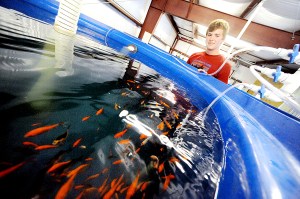
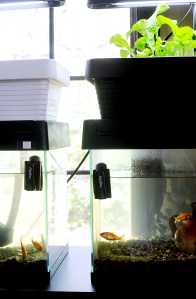
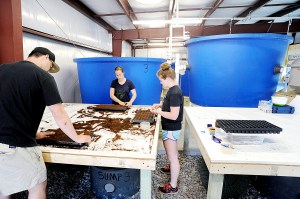
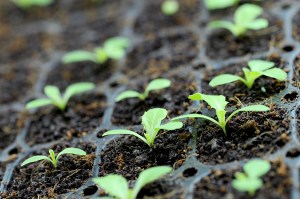
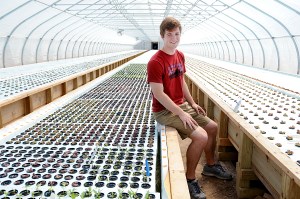
Comments are no longer available on this story